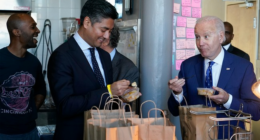As someone who has been writing, testing and publishing recipes for decades, let me be start by saying this:
There is no such thing as an ‘original’ recipe when it comes to classic dishes like a lasagne, a lemon tart, or – as we’ve recently learned – a humble caramel slice.
When it comes to modern dishes or totally novel inventions, then sure, we can use words like ‘original’. But if we’re talking about traditional recipes that have been around for decades, even centuries, then sorry, that term simply does not apply.
Yet this week, the internet exploded over what’s being dubbed ‘recipegate’ – an online war between Australia’s adored RecipeTin Eats founder Nagi Maehashi and content creator and baking author Brooke Bellamy, a.k.a. Brooki Bakehouse.
The battleground? A caramel slice recipe posted by Brooki that bears an uncanny resemblance to one previously posted by Nagi. And by ‘resemblance’, we’re talking the same ingredients and a similar process. Because, let’s face it, how many ways are there to make a caramel slice? If you speak to a thousand grandmas, chances are they have the same recipe written down on a scrumpled piece of paper somewhere.
Now, before Nagi’s diehard fanbase comes for me with spatulas raised, let me be clear: Nagi has built an incredible empire, and I deeply respect what she’s achieved. Her recipes are solid and thoroughly tested, her following is loyal, and she has undeniably changed the game for how Australians cook at home.
But as a fellow cookbook author, I believe this latest move – publicly calling out Brooki and then mobilising her enormous online community against another creator (who, happens to be four months pregnant) – was not just unwise, but unfair.
Because here’s the truth no one wants to admit in this debate: we all copy each other.

Nagi has built an incredible empire, and I deeply respect what she’s achieved, but I can’t agree with how she’s handled recipegate, writes journalist and cookbook author Faye James

RecipeTin Eats founder Nagi Maehashi (pictured) has accused Brooke Bellamy, aka Brooki Bakehouse of stealing her caramel slice and baklava recipes
We refine, we reinvent, we ‘make it our own’ – but the bones of most popular recipes have been floating around kitchens, family cookbooks and food magazines for decades.
I know, because I’ve lived it. I’ve spent years researching food trends and nutritional science for books like The Long Life Plan and The Menopause Diet, and trust me, 90 per cent of the recipes you’ll find in cookbooks today are evolutions of dishes that have been done – and redone – a hundred times before.
Some of these evolutions, in fact, are near-carbon copies of what’s been published before, only with slightly different wording and a few minor tweaks.
When I wrote my 2019 book The 10:10 Diet – a weight-loss and recipe program built on a foundation of time-based eating and metabolic support – I poured years of knowledge and creativity into every chapter.
It gained a loyal following, particularly among women seeking balance and sustainable health. But by 2023, I saw a copycat version of my book with a near-identical title in bookstores. It became a bestseller for its author and publisher.
Did I feel hurt? Of course. Did I want to post side-by-side screenshots and rally my followers? Perhaps. But I didn’t – because I knew that at the end of the day, ideas aren’t islands. They spread, they evolve, and yes, sometimes they get borrowed.
That’s the business we’re in.
And to be perfectly frank, there’s no copyright law in Australia that protects a recipe in the traditional sense. As legal analysis by The Conversation rightly points out, it’s the unique literary expression – the wording, the storytelling, the voice – that might be protected, not the list of ingredients or method itself. So unless Brooki copied Nagi’s recipe method word-for-word, she hasn’t done anything wrong.

Bellamy was accused of copying recipes for her bestselling book Bake with Brooki (pictured)

Bellamy (pictured at the TikTok Awards on November 27, 2024) has denied the allegations
Instead, we saw something else entirely: a digital pile-on that felt less like a measured defence of intellectual property and more like mob justice.
And while Nagi might not have explicitly told her followers to harass Brooki – and we are not suggesting she did – when you post an accusation to a social media audience of millions, the reaction is predictable.
Words have power. Influence has power. How we choose to use our platform says everything about us.
Now, I’m not naïve. In an industry where clicks and content are currency, I understand the temptation to draw lines in the sand, to protect what feels like ‘yours’. But in food media – especially in the baking world – we all draw from the same well. A caramel slice will always have the same five to six basic ingredients. A Victoria sponge, the same ratios. A choc chip cookie? Don’t even get me started.
When I write recipes, I research what’s out there. I test endlessly in my kitchen. I try to bring a unique spin, whether through a health angle, flavour tweak or visual presentation. But I don’t kid myself into thinking I have reinvented the wheel. I’m not Heston Blumenthal forging new culinary territory in a laboratory – I’m developing accessible, healthy recipes for real people with real lives.

A cookbook remarkably similar to my own later became a bestseller. I could have spoken up but accepted that’s the business we’re in.
Even Colin Fassnidge weighed in on the debate, posting a tongue-and-cheek comment online in which he said he’d copied Gordon Ramsey’s soufflé. Colin, you are a man after my own tart.
Luke Mangan has also noted that Nagi borrowed one of his butter chicken recipes. While she did credit him, he told The Courier Mail, ‘I would have preferred a bigger mention and at least linking people to our website.’
And that’s where I find myself sympathising with Brooki. She’s a younger creator, just starting out in publishing, likely under enormous pressure to deliver content that connects. She’s also a baker. Her caramel slice, while similar to Nagi’s, was one she had been baking in her store before it was posted on RecipeTin Eats. She has since addressed the accusations and taken a respectful tone in doing so.
So what should we, as recipe developers, cookbook authors and creators do instead?
For one, we should hold space for the reality of creative overlap. We should credit where it’s due, of course, and avoid outright plagiarism at all costs. But we should also approach these situations with a bit more empathy.
Because when the icing sugar settles, what do we want our food-writing legacy to be? One of inclusion, inspiration and community? Or a bitter, gatekept space where success is hoarded and up-and-comers are punished for daring to share in the same culinary conversation?

There is no such thing as an ‘original’ recipe when it comes to classic dishes, according to cookbook author Faye James (pictured)

Faye James’ latest book is The Perimenopause Plan
I believe there’s room for all of us – veteran authors, food bloggers, TikTok creators and cookbook newbies alike. The more voices we have in the food space, the more diverse, exciting and inclusive it becomes.
To Nagi, I say this with genuine respect: you’re a powerhouse. Your fans adore you, and rightly so. But perhaps a public dressing-down wasn’t the best avenue to pursue. We all stand to gain when we uplift rather than attack.
And to Brooki: keep baking, keep sharing, and don’t let this moment define you. Every cookbook author has had their work ‘borrowed’ in some way – take it as an uncomfortable but oddly validating rite of passage.
Because in the end, a caramel slice is just a caramel slice – but how we treat one another in the process of sharing it? That’s what truly leaves a taste in the mouth.
Faye James is a journalist and cookbook author whose titles include The Long Life Plan, The 10:10 Diet, The Menopause Diet and The Perimenopause Plan

To Brooki (pictured): Keep baking, keep sharing, and don’t let this moment define you. Every cookbook author has had their work ‘borrowed’ in some way – take it as an uncomfortable but oddly validating rite of passage.







